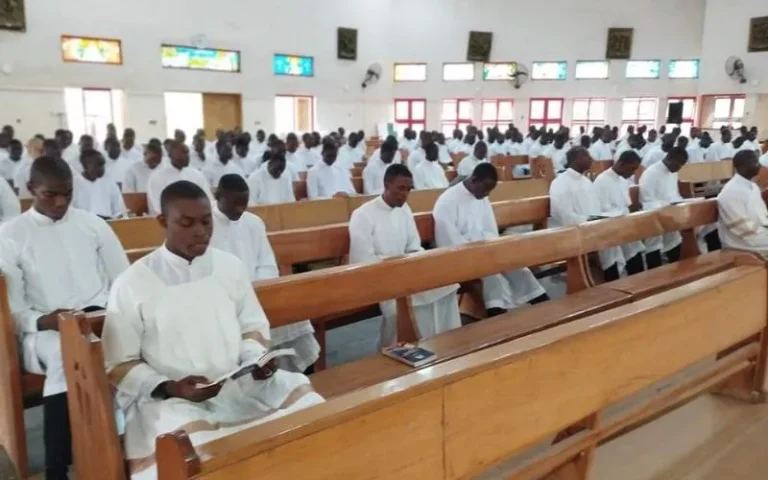ACI Africa asked Sakaba whether or not the instructors discuss with the seminarians the risks they run, including that of being kidnapped or even killed, to which the priest replied: “Yes, as trainers, we we have the duty to support our seminarians through practical courses. experiences – both academic, spiritual and physical. We share with them this reality of persecution, but for them to understand, we connect the reality of the persecution of Christians in Nigeria to the experiences of Jesus. In this way, we believe it would be easier for them to not only have the strength to face what they are facing, but also to see meaning in their suffering.
“Suffering only has meaning if it is linked to the pain of Jesus,” the priest said. “The prophet Isaiah reminds us that “by his wounds we are healed.” Jesus also teaches us that if the grain of wheat does not fall into the ground and die, it will remain a single grain, but only when it falls and dies does it yield a rich harvest. Teachings like these are those that strengthen our resilience in the face of persecution.

Sakaba spoke of the joy of those who look forward to “returning to God in a holy way.”
“Whatever happens, we will all return to God. How joyful it is to return to God in a holy way, through sacrifice. he said. “This holiness is accepting this cross, this pain. Jesus accepted the pain of Calvary and it led to his resurrection. Persecution purifies the individual so that he or she becomes the finished product for God. I believe that these attacks are God’s plan and that no human being can stop God’s work.
However, the rector clarified that those who enroll in the seminary do not go in search of danger.
“Here, people don’t go out and put themselves in risky situations,” he said. “But when such situations arise, Jesus’ teachings and his persecution give us the courage to face whatever might happen to us. »
Sakaba said that although priestly formation in Nigeria embraces the “spirituality of martyrdom,” persecution in the West African country presents “a difficult reality.”
“It’s hard to get used to the pain. It’s difficult to get used to the problems of death…to get familiar with death,” he said. “No one chooses to put themselves in danger just because other people are suffering; it is not part of our nature. But in a situation where you seem to have no alternative, God’s grace steps in to strengthen you to face the particular situation.
Sakaba said that since the 2020 attack on the Major Seminary of the Good Shepherd, the institution had an air of uncertainty. He said some of the kidnappers arrested in the incident had been released, a situation he said had plunged the major seminary into “fear of the unknown.”
“It hasn’t been easy for us since the release,” Sabaka told ACI Africa. “The community was in confusion because of the unknown. We don’t know what will happen next. We don’t know when they will return or what they will do to us. We don’t know who will be taken next.

However, in the face of this, Sabaka said the resilience of the seminary community has been admirable. “God supports us, encourages us and guides us. His grace has helped us continue to practice our faith,” he said.
Jihadist attacks, which continue unabated in the communities surrounding the seminary, are not making the situation any easier.

“Every attack that occurs outside of our community reminds us of our own experience in 2020. We are shocked and, although we remain deeply hurt, we believe that God has guided us,” he said.
This story was first published by ACI Africa, CNA’s information partner in Africa, and was adapted by CNA.



